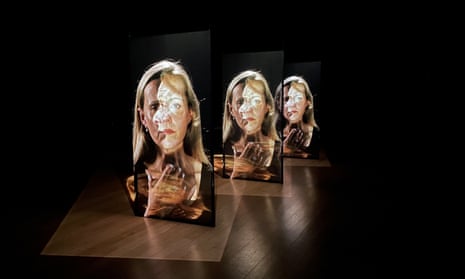In March 2020, Tanja Bage, a singer and performer, made a phone recording of herself for her children, then aged four and coming up to two. “I’m going to sound a little bit different,” she told them. “You’re not going to remember.”
Poignantly, she added: “I like my voice, I like the way I sound.”
Two days later, Bage had her voice box removed as part of her treatment for laryngeal cancer. She was unable to speak at all until a voice prosthesis was implanted in her neck, allowing her to form sounds.
This week, Bage will be back on stage to perform in a remarkable concert that celebrates the human voice by bringing together people who have experienced vocal loss with professional singers.
Alongside the renowned soprano Lucy Crowe, Bage will tell the story of losing and regaining her voice. “I can’t sing now, and I miss that hugely. But I can do something that is creative and expressive,” she said.
The one-off performance, Sound Voice in Concert, at Kings Place in London on Friday, is the creation of the composer Hannah Conway, who has worked with some of the world’s leading opera houses and orchestras for 25 years, and the writer Hazel Gould.
Six operatic movements based on the stories and insights of people who have experienced voice loss – through causes that include laryngectomies, Parkinson’s and motor neurone disease – will be performed.
“I wanted to examine what a voice is, and what it means when it has gone,” said Conway. “I deal with the human voice every single day, how we use our voices, how we convey emotive narrative through our voices.” But it was only when a close family member lost his speech through illness that she “truly understood the intrinsic value of the human voice and how it intersects our identity”, she said.
She launched the Sound Voice project, which works with Shout at Cancer, a choir for people who have had laryngectomies, a research team at UCL, health professionals and technology experts.
Conway and Gould led workshops over two years to evolve an understanding of what the voice is, which the pair then translated into operatic pieces for this week’s concert.
“Opera is one of the most extreme examples of what humans can do. That is paired with incredibly interesting new voices of people who have gone through or are in the middle of extreme trauma to make pieces that have real integrity, and are made for and with people whose stories we’re telling,” Conway said.
“All of the pieces are emotionally powerful and heart-rending, but at the same time they are about hope and celebrating the beauty of these voices, and people actually reaffirming their identity with their new voices.”
For Bage, who was 38 when her cancer was diagnosed, losing her voice has “had a bigger emotional impact than the physical changes and changes to my anatomy that I live with every day”.
After her laryngectomy, she had intensive speech therapy to learn how to produce sound through her voice prosthesis. Two years later, she says she has “come to terms with and accepted the way that I sound”.
She is no longer having treatment for cancer. But, she added: “I don’t think I’ll ever not miss my voice. It’s been a grieving process. There’s always a sadness about what I’ve lost.”
